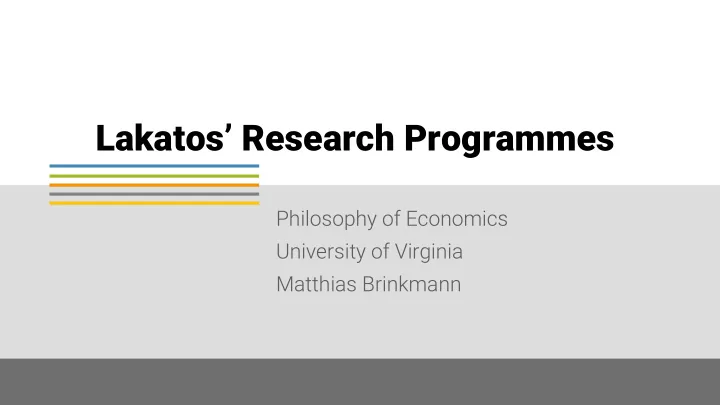

Lakatos ’ Research Programmes Philosophy of Economics University of Virginia Matthias Brinkmann
Contents 1. Research Programmes 2. Economics as a Research Program 3. Quiggin on the History of Macroeconomics 4. Problems Lakatos' Research Programmes 2
Research Programmes • The unit of theoretical assessment is protective the research program , not any belt individual theory • A research program consists of hard a hard core: unquestioned assumptions a protective belt: changeable core a positive heuristic: injunctions on how to pursue research, and what questions/anomalies to investigate a negative heuristic: prohibitions on how not to pursue research/react to new observations Lakatos' Research Programmes 3
Progressive vs degenerate research programmes • Progressive shifts theoretical progress : excess empirical content (“predicts some novel, hitherto unexpected fact”) empirical progress: some of this excess empirical content is corroborated • Degenerating shifts ad hoc modifications in protective belt in response to empirical anomalies A B C A B D A D E H H H Lakatos' Research Programmes 4
Insights from Lakatos • What matters for the scientificness of a theory is how it develops over time • Theory choice is always comparative • There are not “scientific” and “unscientific” research programmes; the question is one of degrees • Whether a research programme was successful can often only be known retrospectively • More focus on the context of discovery through the idea of positive/negative heuristics • The history of science becomes important Lakatos' Research Programmes 5
Questions • How do Lakatos and Popper compare? • Can Lakatos answer Putnam’s critique? • How do Lakatos and Friedman compare? • For the future: How do Lakatos and Kuhn compare? Lakatos' Research Programmes 6
Lakatos on Newton’s Theory For example. Newton first worked out his programme for a planetary system with a fixed point like Sun and one single point — like planet. It was in this model that he derived his inverse square law for Kepler's ellipse. But this model was forbidden by Newton's own third law of dynamics. Therefore, the model had to be replaced by one in which both Sun and planet revolve round their common center of gravitation. This change was not motivated by any observation but by a theoretical difficulty in developing the programme. Then he worked out the programme for more planets as if there were only heliocentric but no interplanetary forces. Then he worked out the case where the Sun and planets were not mass-points but mass-balls. Again, for this change he did not need the observation of an anomaly; infinite density was forbidden by a touchstone theory, therefore planets had to be explained. This change involved considerable mathematical difficulties, held up Newton's work and delayed the publication of the principia, by more than a decade. Having solved this puzzle, he started working on spinning balls and their wobbles. Then he admitted interplanetary forces and started work on 'perturbation'. At this point he started to look more anxiously at the facts, many of them were beautifully explained by this model, many were not. It was then that he started to work on bulging planets, rather than round planets, etc. Lakatos' Research Programmes 7
Contents 1. Research Programmes 2. Economics as a Research Program 3. Quiggin on the History of Macroeconomics 4. Problems Lakatos' Research Programmes 8
Weintraub’s Reconstruction of the Hard Core 1. There exist economic agents. 2. Agents have preferences over outcomes. 3. Agents independently optimize subject to constraints. 4. Choices are made in interrelated markets. 5. Agents have full relevant knowledge. 6. Observable economic outcomes are coordinated, so they must be discussed with reference to equilibrium states. Lakatos' Research Programmes 9
Advantages • Many research programmes in economics seem to have a hard core which researchers don’t touch • Lakatos ’ approach appears to better account for what economists are actually doing • Much progress in economics seems to be theoretical (but is this “theoretical” in Lakatos ’ sense?) “A methodology that allows access to the kingdom of science without repentance for a lifetime of non-falsificationist practice is simply too alluring for most economic methodologists to resist .” (Hands 1985, 2) Lakatos' Research Programmes 10
Contents 1. Research Programmes 2. Economics as a Research Program 3. Quiggin on the History of Macroeconomics 4. Problems Lakatos' Research Programmes 11
Contents 1. Research Programmes 2. Economics as a Research Program 3. Quiggin on the History of Macroeconomics 4. Problems Lakatos' Research Programmes 12
Questions • Does Lakatos ’ theory adequately portray the history of science? (Feyerabend/Kuhn: it does not.) • Is there really a hard core in economics? Is Weintraub’s reconstruction of the hard core so broad as to be vacuous? • Do particular economic research programmes make empirical progress? Theoretical progress? • How do we individuate research programs? • Are there any clear, usable rules for when a research program is degenerate, and when it is progressive? • Is Lakatos a realist? Or an anti-realist (e.g., a Hegelian)? Lakatos' Research Programmes 13
Recommend
More recommend